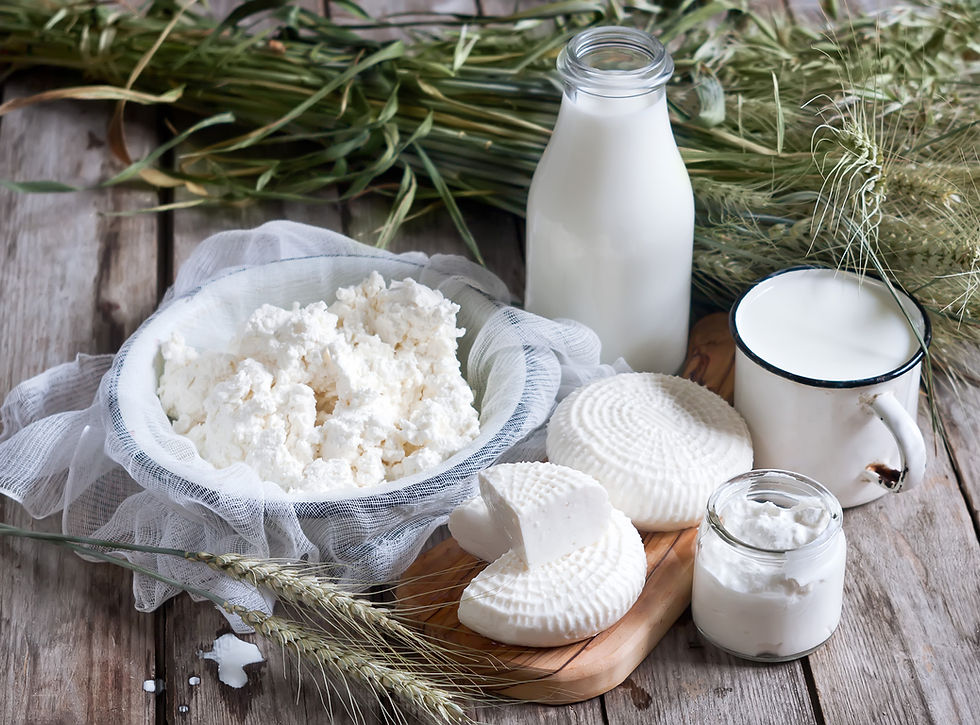The Impact of Dairy on Skin Health: Separating Fact from Fiction
- DeJarra Sims
- Jul 13, 2023
- 3 min read
Dairy is a pervasive ingredient in the Western diet, considered both a staple, and a comfort food. However, concerns about mass agricultural practices and the presence of growth hormones and antibiotics have sparked discussions about the quality and impact of dairy products on our health. In particular, its effects on skin health have garnered attention.

The Negative Impact of Dairy on Skin Health
Acne:
Dairy is a highly inflammatory food that can aggravate acne-prone skin. The hormones naturally present in dairy products can disrupt the body's balance, leading to hormone imbalances, oily skin, and breakouts.
Eczema:
Casein, a protein found in cow's milk, has been identified as a potential trigger for eczema. Individuals with eczema may find relief by switching to goat or sheep's milk products, although all dairy products can still contribute to flare-ups due to their inflammatory properties.
Aging:
Consumption of pasteurized dairy has been linked to premature aging of the skin. The protein oxidation that occurs during pasteurization can accelerate skin aging. Additionally, the loss of digestive enzymes during this process hampers nutrient absorption, potentially leading to digestive issues and skin problems. Choosing raw, unpasteurized dairy products may help mitigate these concerns.
The Positive Impact of Dairy on Skin Health
Anti-Aging:
When applied topically, yogurt's antioxidants fight free radicals, which can cause premature aging and wrinkles. The lactic acid in dairy acts as a gentle exfoliator and tightens pores, giving the skin a more firm appearance.
Brighten and Correct Blemishes:
The lactic acid found in dairy can lighten discolorations and even out skin tone. Using a yogurt face mask provides moisture to the skin, leaving it soft and supple, unlike harsher blemish-correcting treatments that may cause redness and irritation.
Decrease Acne:
Yogurt's ability to balance the levels of good and bad bacteria on the skin can help clear acne by killing acne-causing bacteria. Despite dairy being considered an inflammatory food, yogurt applied topically acts as an anti-inflammatory treatment, reducing facial redness and minimizing the appearance of breakouts.
Application Tips:
To enjoy the benefits of dairy for your skin, apply a layer of plain or Greek yogurt to the face and leave it on for about 10 minutes before rinsing off with warm water. Opt for yogurt sourced from organic, grass-fed dairies to avoid growth hormones, antibiotics, and contaminants. Enhance your yogurt mask by adding a teaspoon of raw honey for extra moisture or the juice from half a lemon for brightening power. Those with sensitive or inflamed skin can incorporate essential oils like lavender for added calming effects. For best results and to avoid irritation, use a yogurt face mask before applying makeup or as part of your bedtime skincare routine once or twice a week.
In conclusion, understanding the potential drawbacks of consuming dairy internally and harnessing its benefits through topical application can help individuals make informed decisions about dairy's role in their skincare routines. While concerns about mass agricultural practices and the adverse effects of consuming dairy products have emerged, utilizing dairy topically, particularly yogurt, dairy can have a positive impact on your skin health. By understanding your skin's unique needs and opting for high-quality dairy sources, you can strike the right balance for a healthier, clearer, and more radiant complexion.
In Health and Wholeness,

PS. If you would like to learn more about healing your chronic skin conditions from the inside out using natural medicine sign up for a FREE 15-MINUTE DISCOVERY CALL WITH ME HERE








Comments